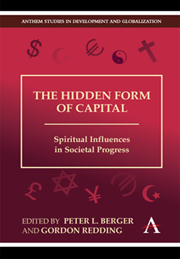Book contents
- Frontmatter
- Contents
- Contributors
- Preface
- Chapter 1 Introduction: Spiritual, Social, Human, and Financial Capital
- Chapter 2 Do Some Religions Do Better than Others?
- Chapter 3 Spiritual Capital and Economic Development: An Overview
- Chapter 4 The Possibilities and Limitations of Spiritual Capital in Chinese Societies
- Chapter 5 How Evangelicanism – Including Pentecostalism – Helps the Poor: The Role of Spiritual Capital
- Chapter 6 Flying under South Africa's Radar: The Growth and Impact of Pentecostals in a Developing Country
- Chapter 7 Importing Spiritual Capital: East-West Encounters and Capitalist Cultures in Eastern Europe After 1989
- Chapter 8 Orthodox Spiritual Capital and Russian Reform
- Chapter 9 Islam and Spiritual Capital: An Indonesian Case Study
- Chapter 10 Separating Religious Content from Religious Practice: Loose and Tight Institutions and their Relevance in Economic Evolution
Chapter 3 - Spiritual Capital and Economic Development: An Overview
Published online by Cambridge University Press: 05 March 2012
- Frontmatter
- Contents
- Contributors
- Preface
- Chapter 1 Introduction: Spiritual, Social, Human, and Financial Capital
- Chapter 2 Do Some Religions Do Better than Others?
- Chapter 3 Spiritual Capital and Economic Development: An Overview
- Chapter 4 The Possibilities and Limitations of Spiritual Capital in Chinese Societies
- Chapter 5 How Evangelicanism – Including Pentecostalism – Helps the Poor: The Role of Spiritual Capital
- Chapter 6 Flying under South Africa's Radar: The Growth and Impact of Pentecostals in a Developing Country
- Chapter 7 Importing Spiritual Capital: East-West Encounters and Capitalist Cultures in Eastern Europe After 1989
- Chapter 8 Orthodox Spiritual Capital and Russian Reform
- Chapter 9 Islam and Spiritual Capital: An Indonesian Case Study
- Chapter 10 Separating Religious Content from Religious Practice: Loose and Tight Institutions and their Relevance in Economic Evolution
Summary
Introduction
One of the most startling empirical puzzles in modern political economy is the lack of convergence between the rich and poor countries in terms of per capita income over time. The East Asian countries grew rapidly in recent decades, but Africa stagnated. Why would development not follow, especially when countries in the so-called third world have received both financial and technical assistance from the rich countries of the West? The ‘great divergence’ does not easily fit into the intellectual framework that economists developed after WWII to explain economic growth and development.
The last twenty years have seen a vibrant debate emerge among economists and political economists concerning this issue. At a conference at Princeton honoring P. T. Bauer in 2004, Amartya Sen was asked what the biggest difference was between the state of the art in development economics in 1964 and in 2004. He replied that the most obvious difference is that in 1964, the market was viewed as a source of exploitation while in 2004 the market was seen as the arena of mutually beneficial exchange and as a source of liberation. From Hernando de Soto to C K Prahalad it is now common-place to hear intellectuals extol the virtues of the small scale trading and beginnings of capital accumulation that P T Bauer emphasized in his work, as opposed to foreign assistance programs. Two books by William Easterly have documented this divergence between the West and the rest and the failed efforts by the West to aid the rest.
- Type
- Chapter
- Information
- The Hidden Form of CapitalSpiritual Influences in Societal Progress, pp. 29 - 40Publisher: Anthem PressPrint publication year: 2010
- 3
- Cited by



